Despite the
central status of the word in the language system and the fact that
speakers have no difficulty in identifying words in speech it is very
difficult to give a satisfactory definition
of
the word. Many attempts have been made to this effect but still there
is no satisfying and universally accepted word definition. This
difficulty is conditioned by word’s complexity, as word is
characterized by many aspects and properties, such as phonological,
morphological, semantic, syntactic, pragmatic ones.
The
attempts to define word proceeded either from one particular
criterion or their combinations. Definitions proceeding from a
phonological
criterion
were offered by Ch. Hocket [Hocket 1978: 166] and P.S. Kuznetsov
[Кузнецов
1964: 7] who claimed that word is any segment of a sentence (Hocket)
or a sequence of sounds (Kuznetsov) which can be separated by pauses
of any length. Such definitions point out at the outer form of the
word, the possibility to single it out between the pauses in actual
speech, but do not disclose its inner faculties, the word’s content
– its meaning.
Purely
semantic
criteria
of
word definition cannot be considered sufficient as well. For instance
St. Ullmann’s definition is based on a semantic criterion: “Words
are meaningful segments of connected discourse”. [Ullmann 1959:
30]. Not only words are meaningful units but also morphemes and
prosodic components of discourse: pauses, intonation, etc. Word
cannot be defined as a unit of the language expressing a particular
concept or notion, although word is related to concept which will be
pointed out later (chapter 2). Besides, concepts are expressed not
only by words but also word combinations, phrases and sentences.
Concept is a category of cognition and it is impossible to establish
a one-to-one correspondence between word and concept.
A.H.Gardiner
based his definition on the semantic-phonological approach: “A word
is an articulate sound-system in its aspect of denoting something
which is spoken about” [quoted from Arnold 1973: 26]. The word has
been syntactically defined as: “A word is the minimum sentence”
by H.Sweet and much later by L.Bloomfield as “a minimum free form”
[Bloomfield 1933: 187].
There were
attempts to combine the semantic, phonological and grammatical
criteria: The definitions by the Czech linguist B. Trnk “Word is a
minimum unit of meaning realized by a definite sequence of phonemes
and capable of mobility within a sentence” [1964: 201] and the
eminent French linguist A.Meillet “A word is defined by the
association of a particular meaning with a particular group of sounds
capable of a particular grammatical employment” [1926: 30] serve
as examples. Despite the fact that the above definitions embrace
various aspects of the word, they were objects of criticism because
(1) not every word is capable of positional mobility, for instance,
articles, prepositions, particles cannot move freely within a
sentence; (2) the definitions do not distinguish between a word and a
word combination. As I.V.Arnold puts it “not only child,
but a
pretty child as
well are combinations of a particular meaning with a particular group
of sounds capable of a particular grammatical employment” [1973:
26].
The word
definitions offered by Soviet/Russian linguists are based on the
theory of signs and modern semantic approaches (see ch.2). For
instance, the definition offered by O.S.Akhmanova runs as folliows:
“Word is the smallest unit of the language functioning within the
sentence, which directly corresponds to the object of thought
(referent) and is a generalized reverberation of a certain ‘slice’,
‘piece’ of objective reality – and by immediately referring to
it names the thing meant”.
In English
and other analytical languages there exist the so-called analytical
forms of certain parts of speech, such as verbs, e.g. have
finished, didn’t go, is reading, etc.,
comparative and superlative degrees of adjectives: more
interesting, most sincerely.
Such words possess certain structural separateness.
Summing
up our review of different definitions we come to the conclusion that
they are bound to be strongly dependent upon the line of approach,
the aim the scholar has in view. For a comprehensive word theory a
description seems more appropriate than a definition.
All
that was said about the word can be summed up as follows. The word is
a linguistic sign. It represents a group of sounds possessing a
meaning, susceptible to grammatical employment and characterized by
formal and semantic unity.
Соседние файлы в предмете [НЕСОРТИРОВАННОЕ]
- #
- #
- #
- #
- #
- #
- #
- #
- #
- #
- #
- Размер: 2.6 Mегабайта
- Количество слайдов: 89
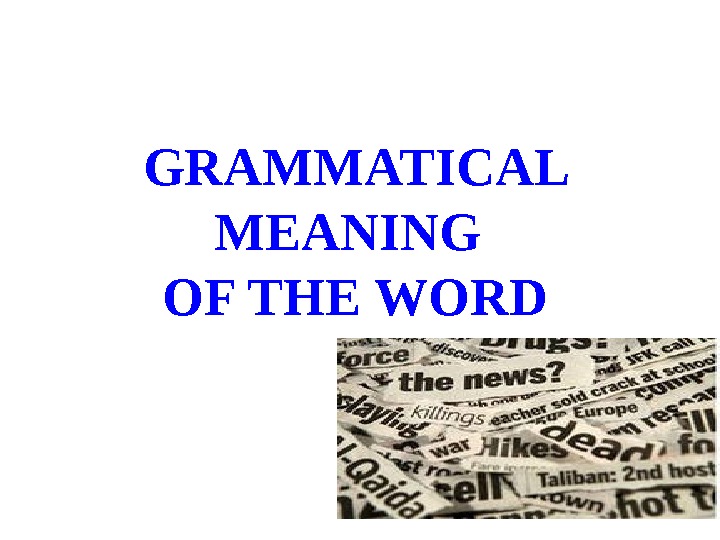

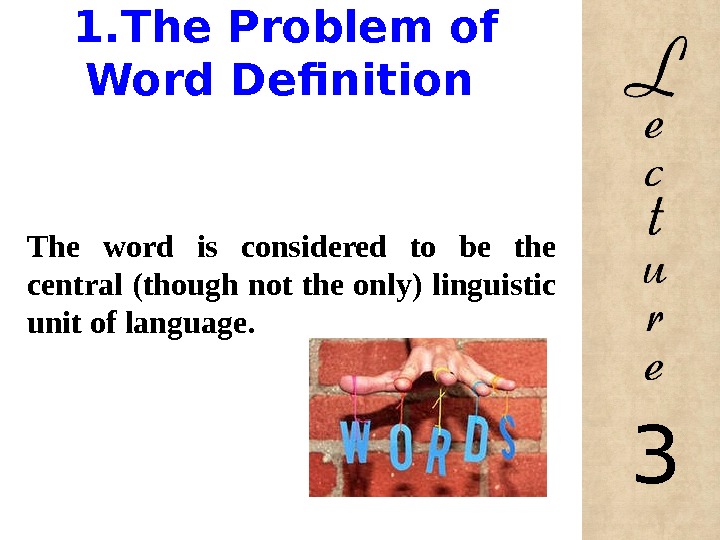
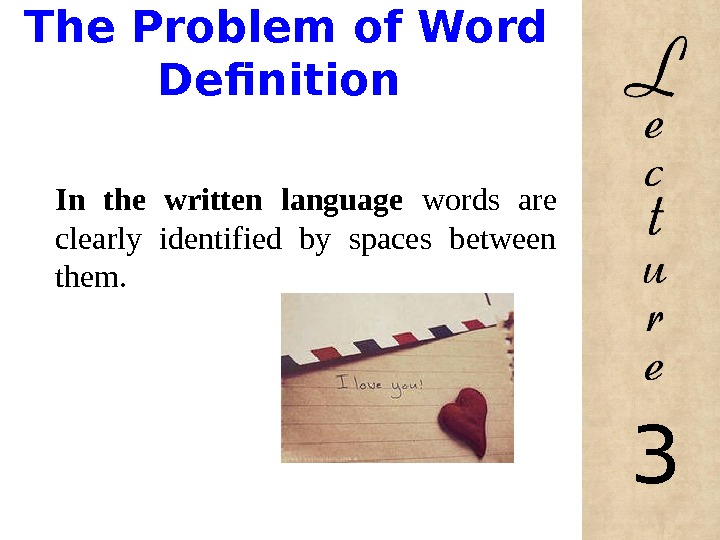
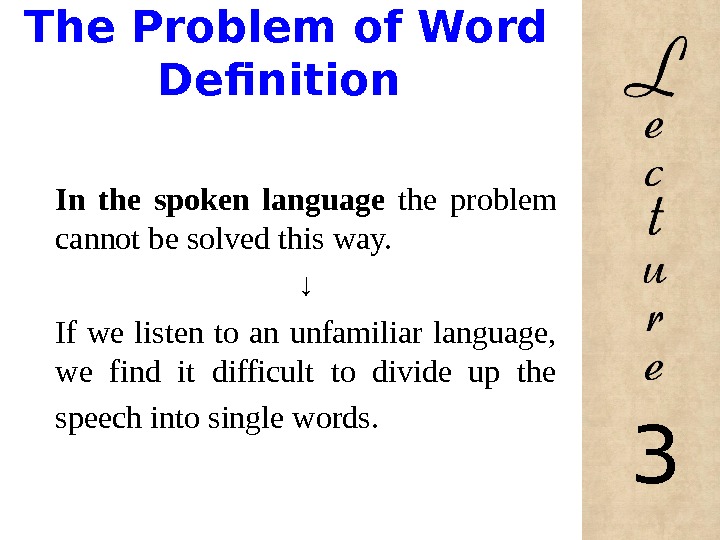
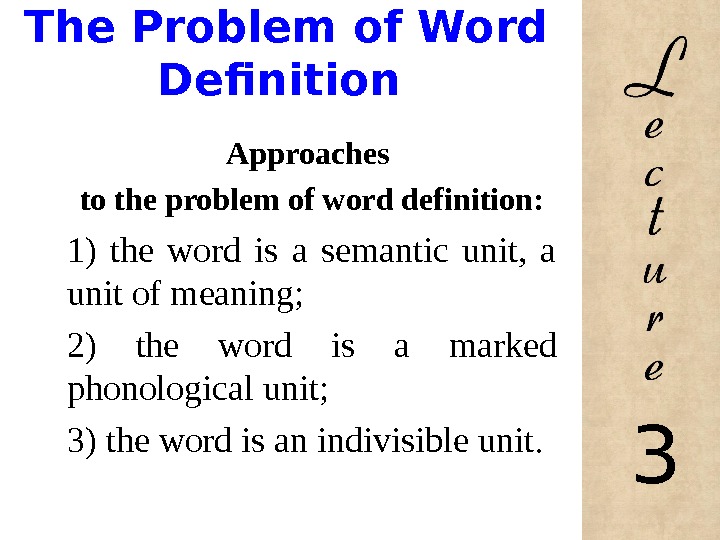
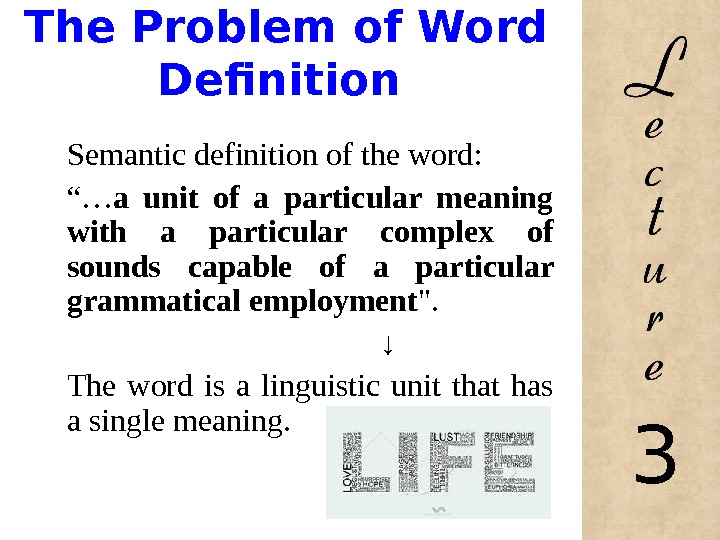
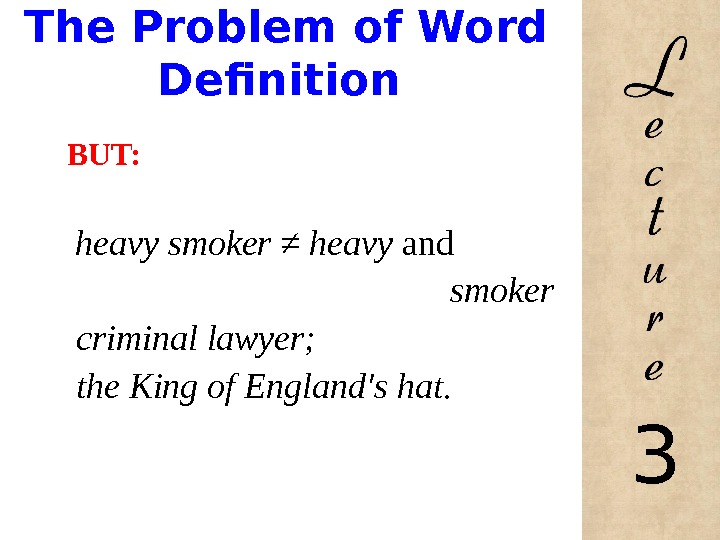


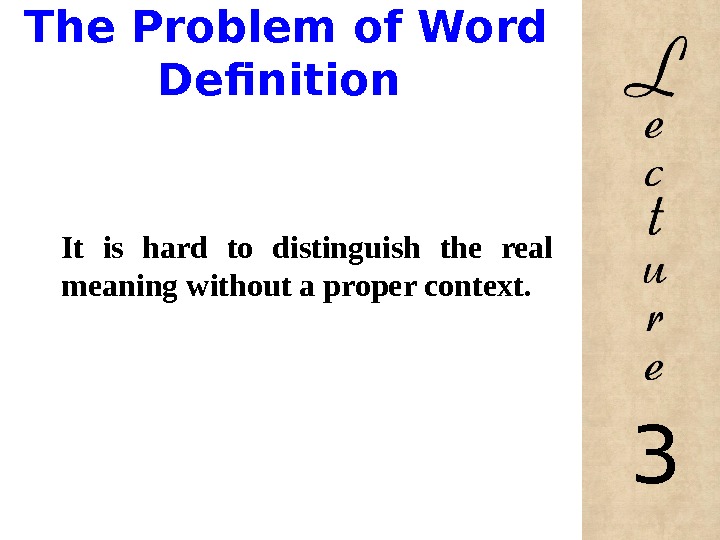

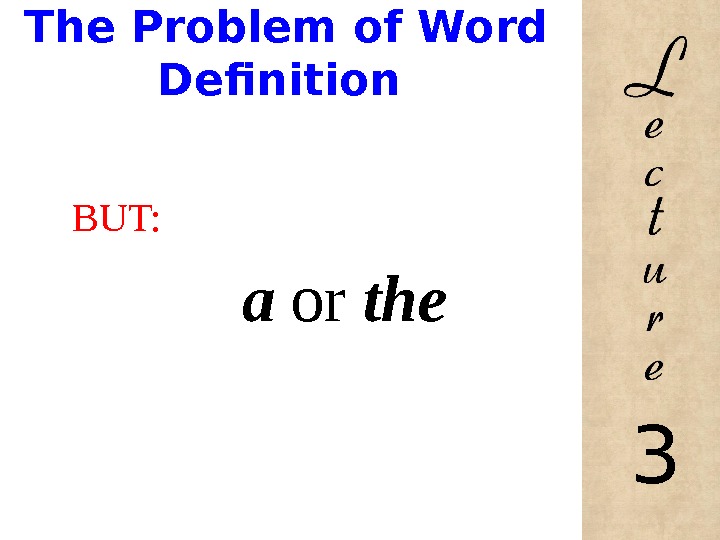
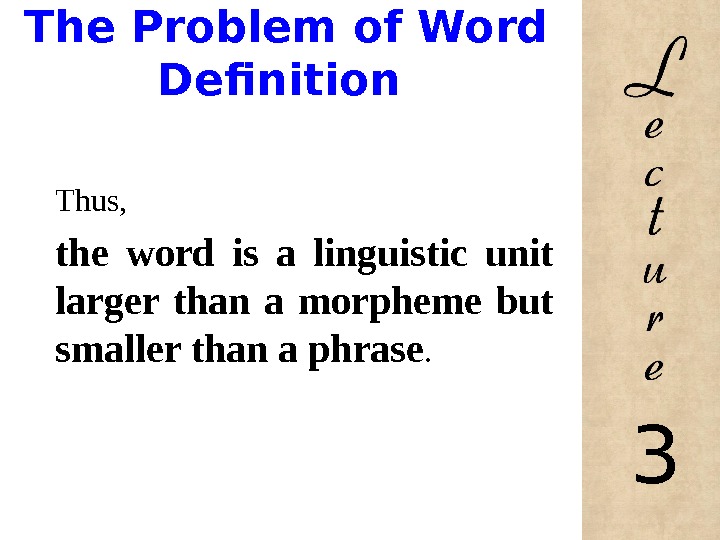
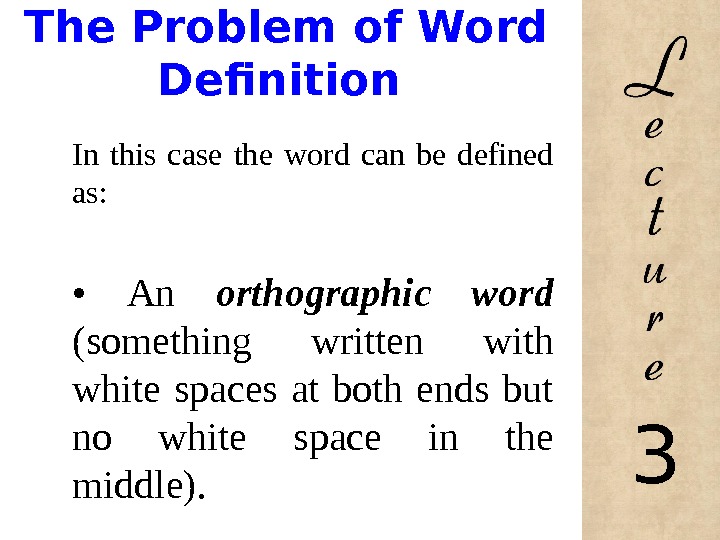

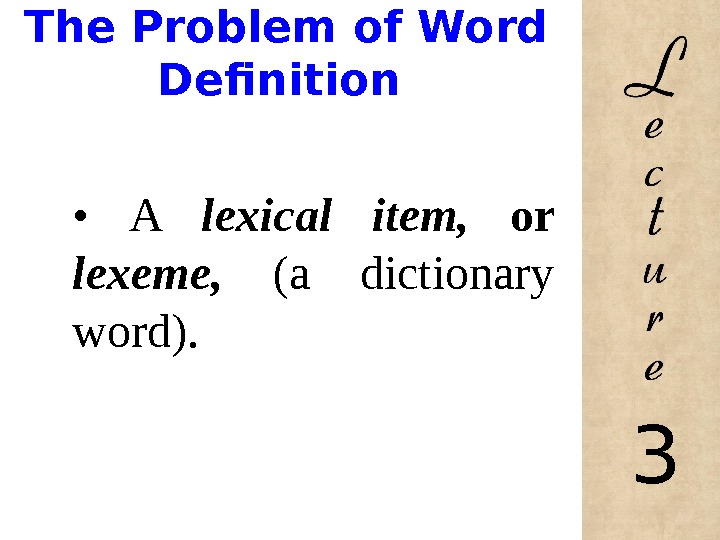

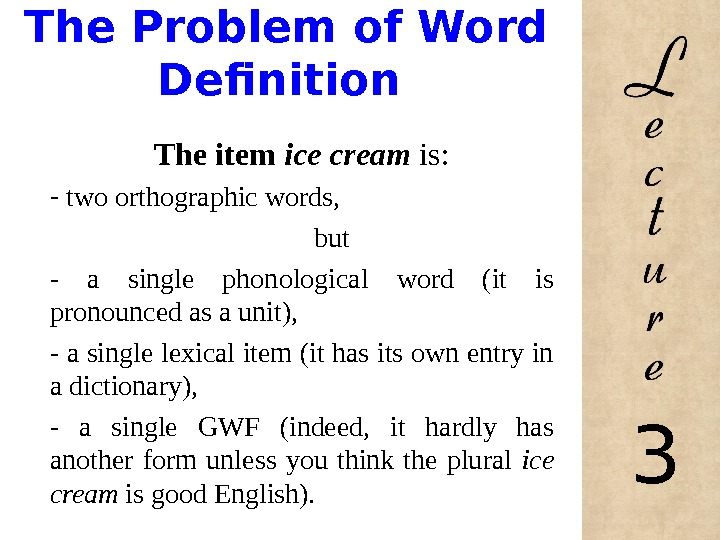
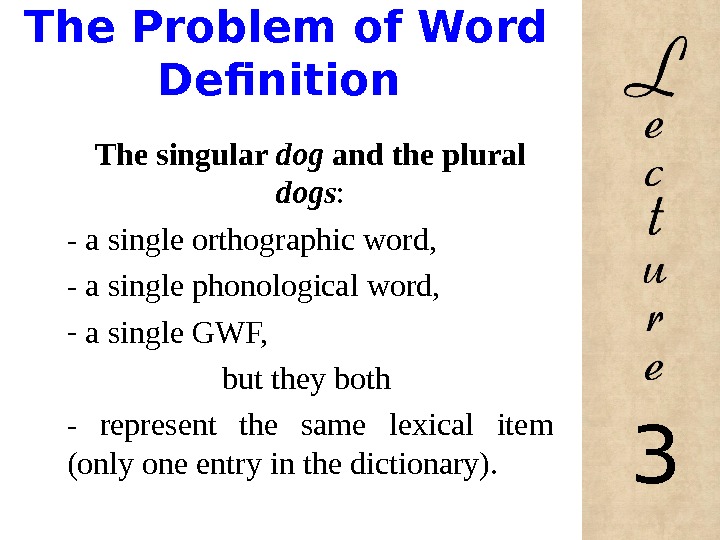
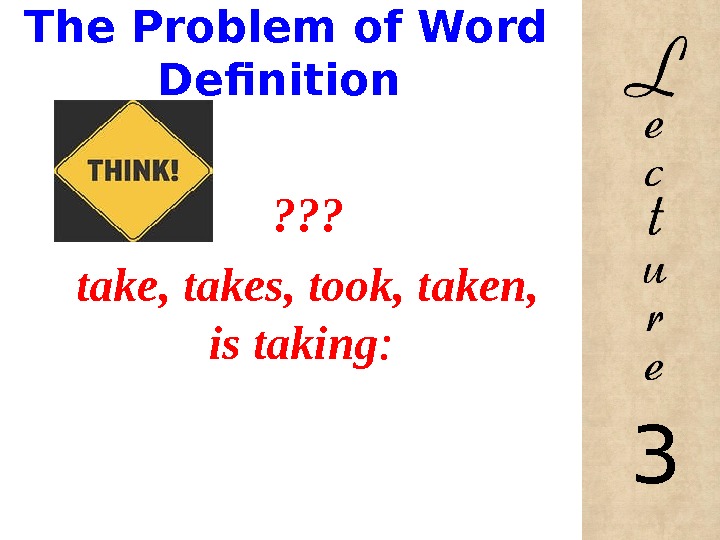
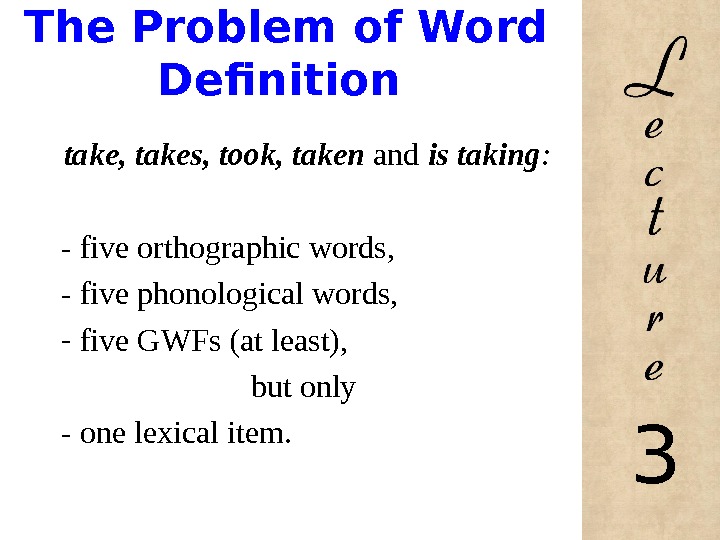
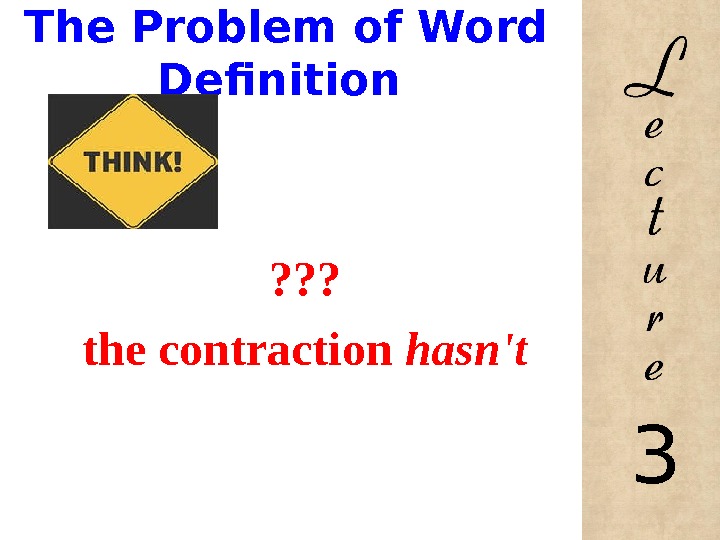

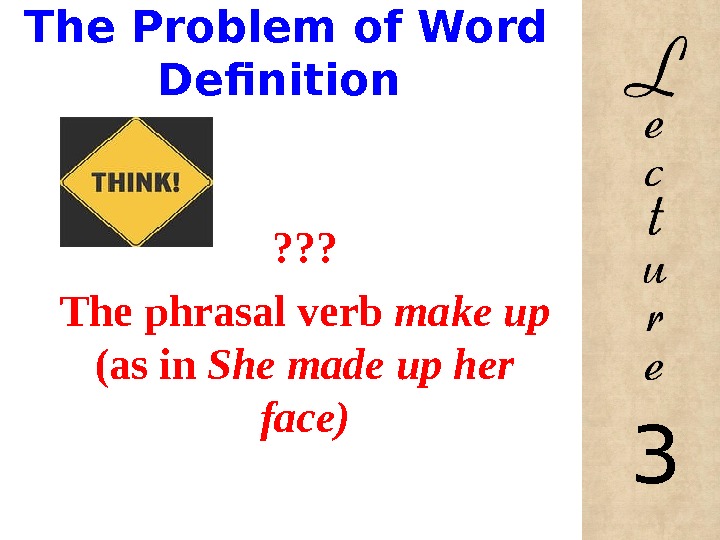
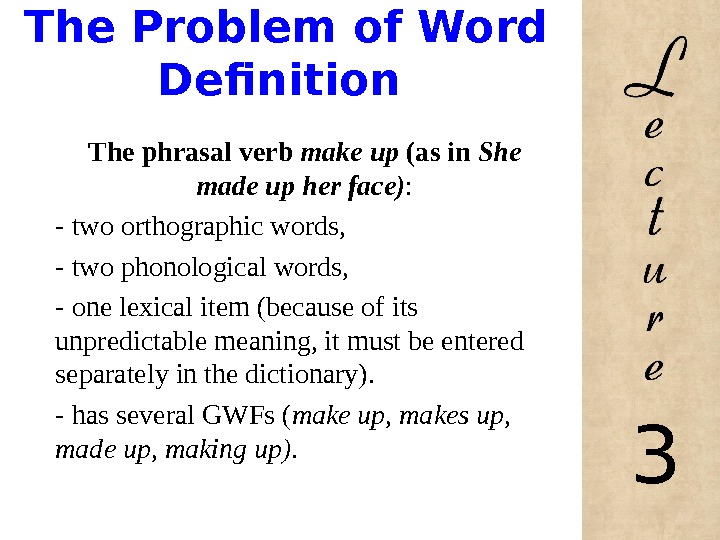

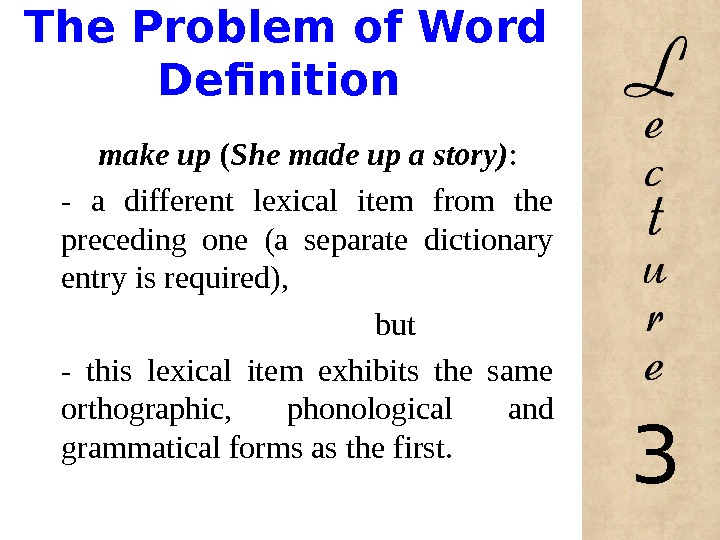
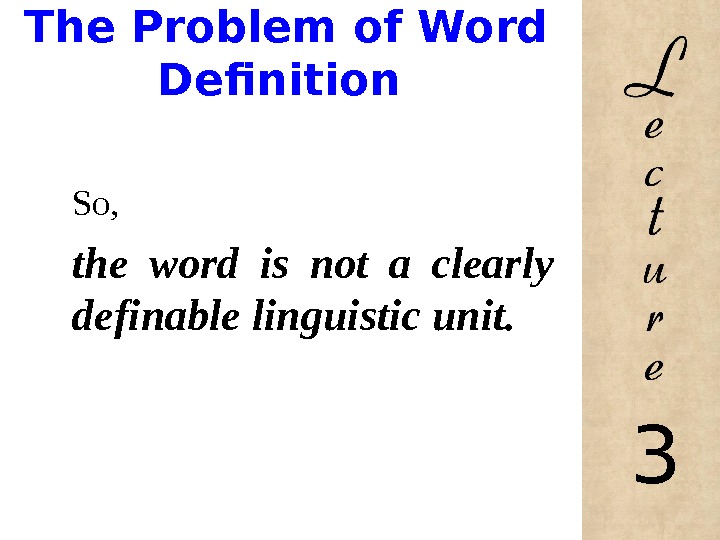
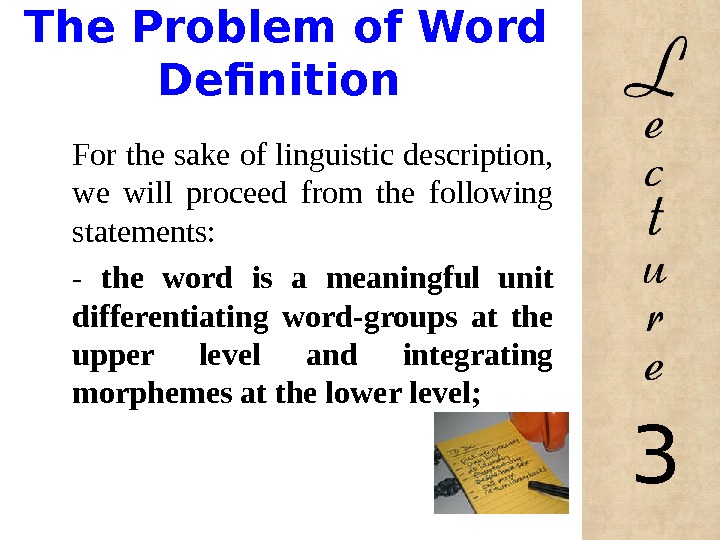
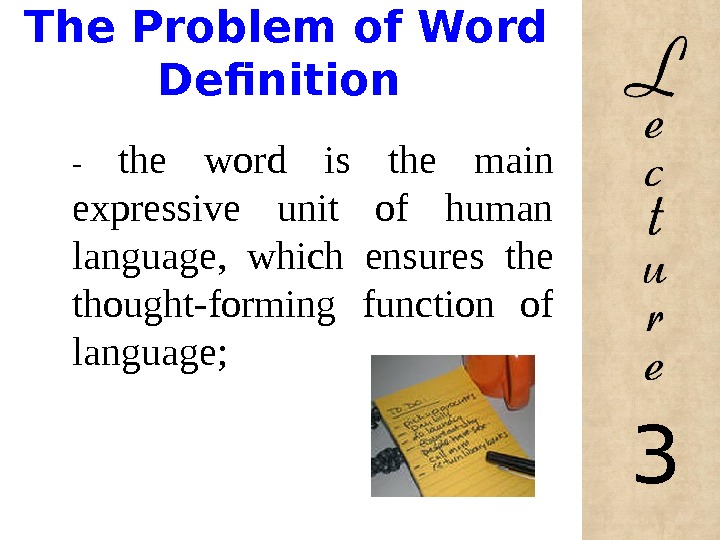
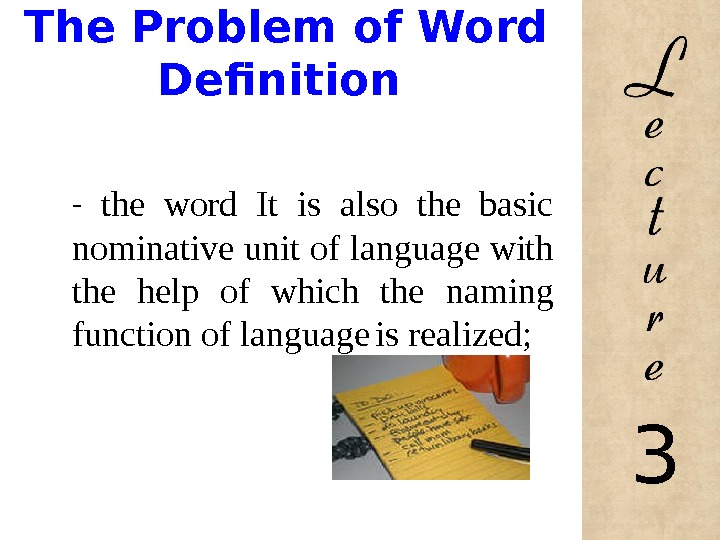
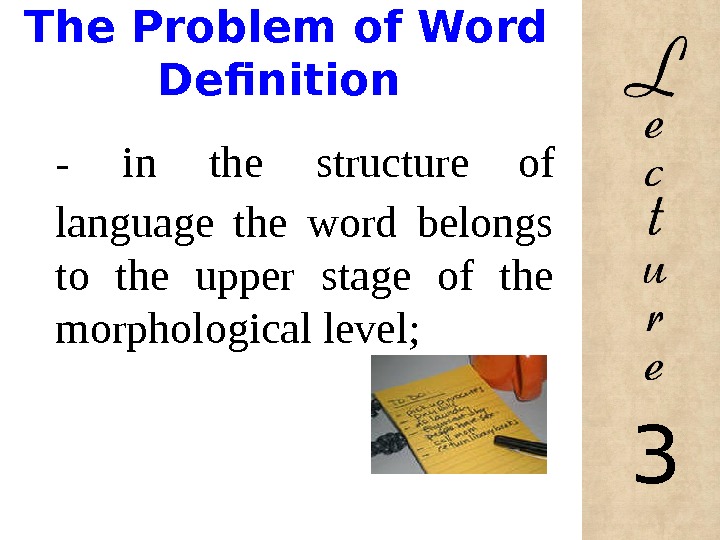
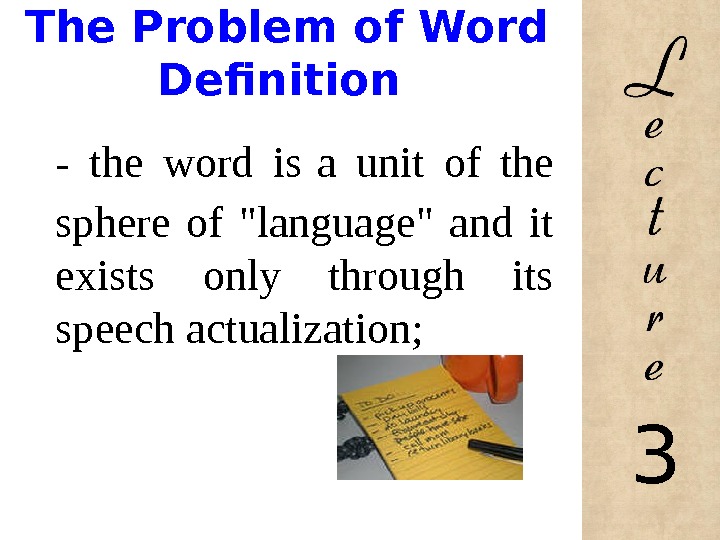
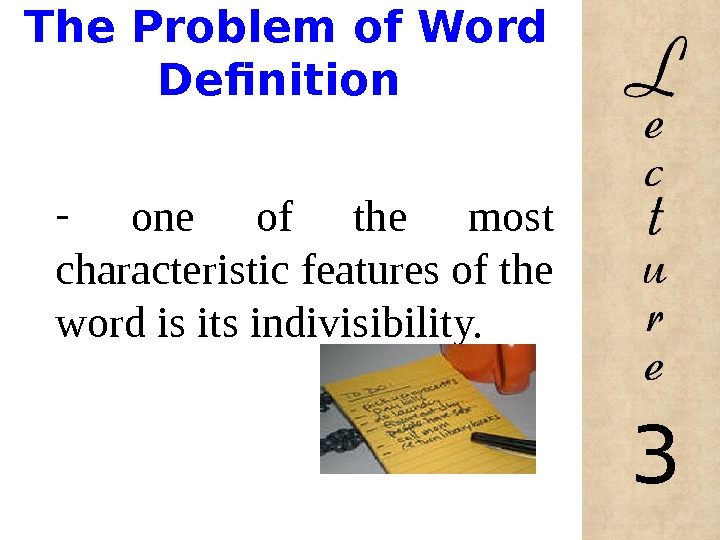
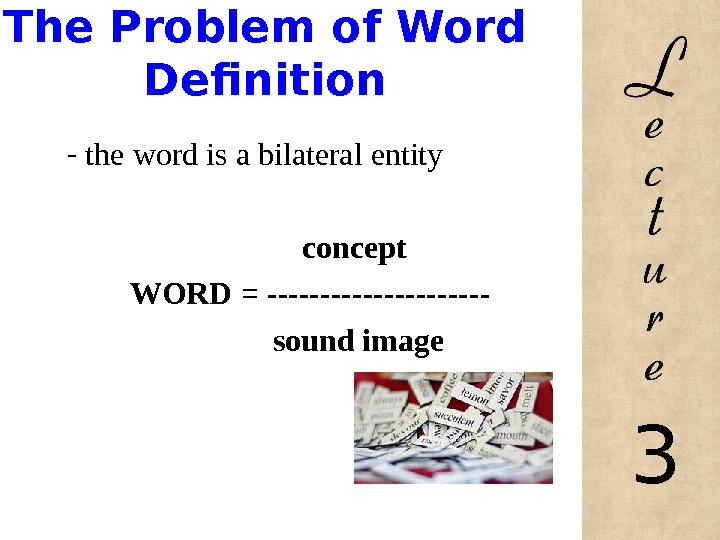
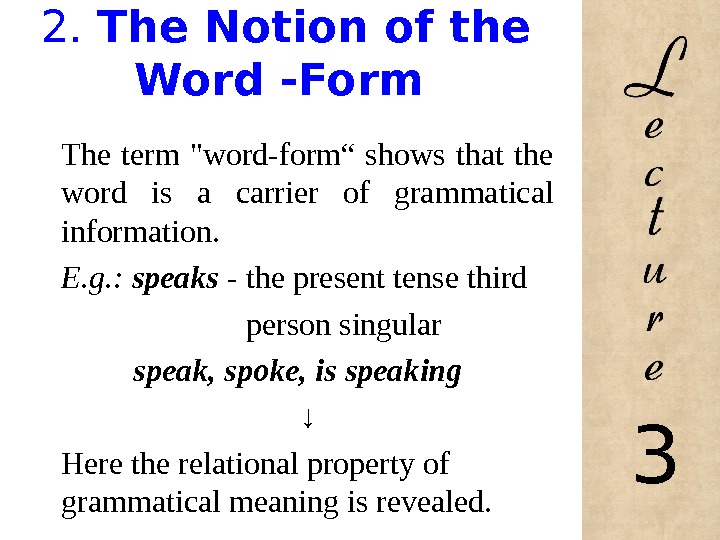

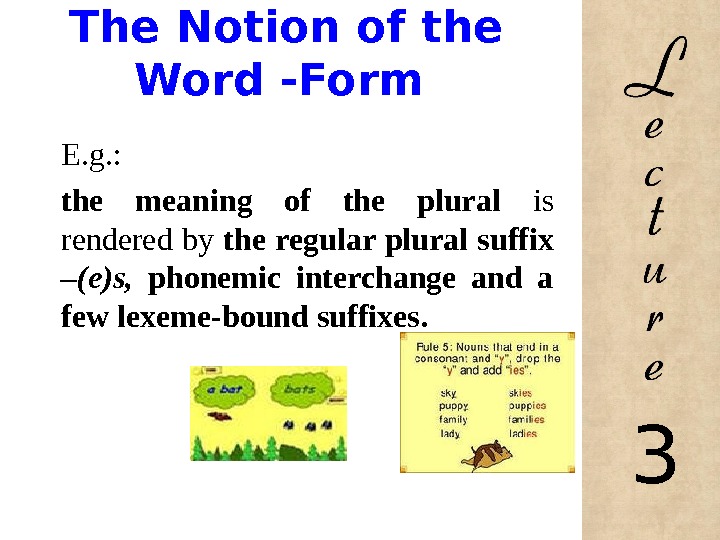

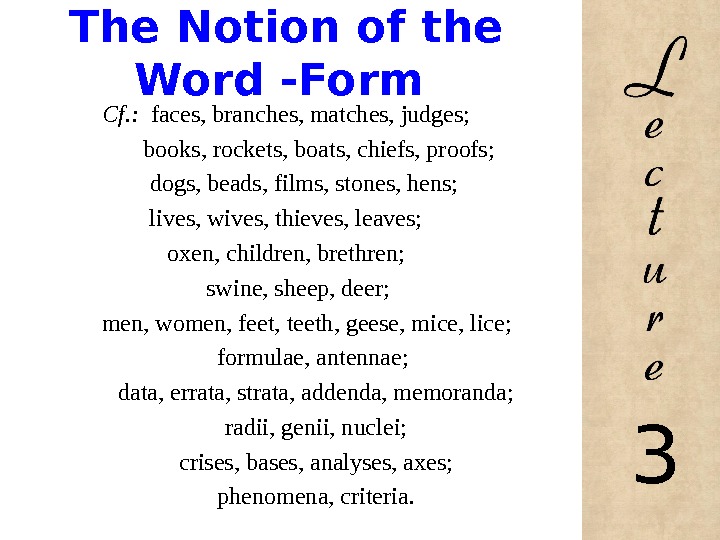
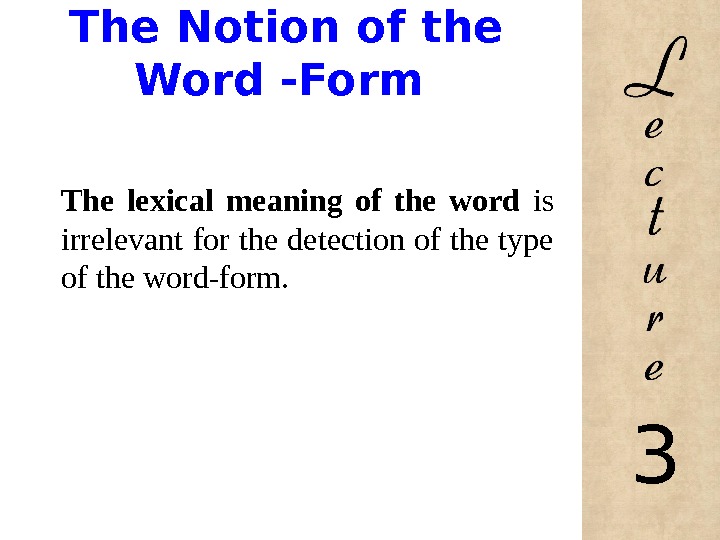

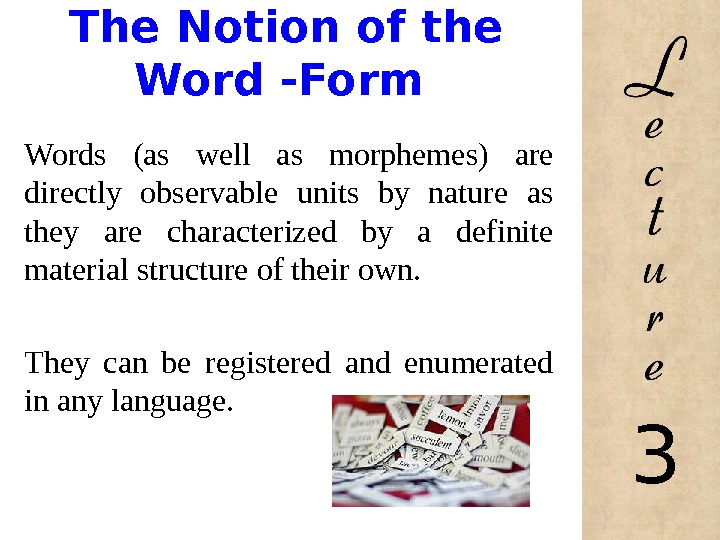
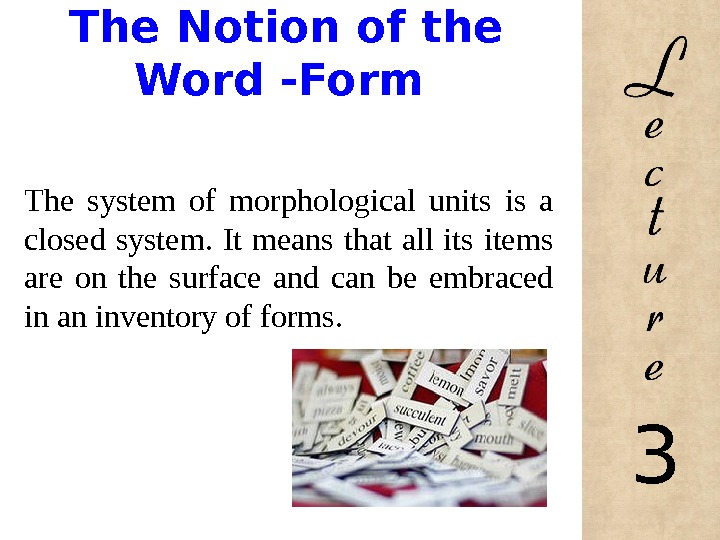
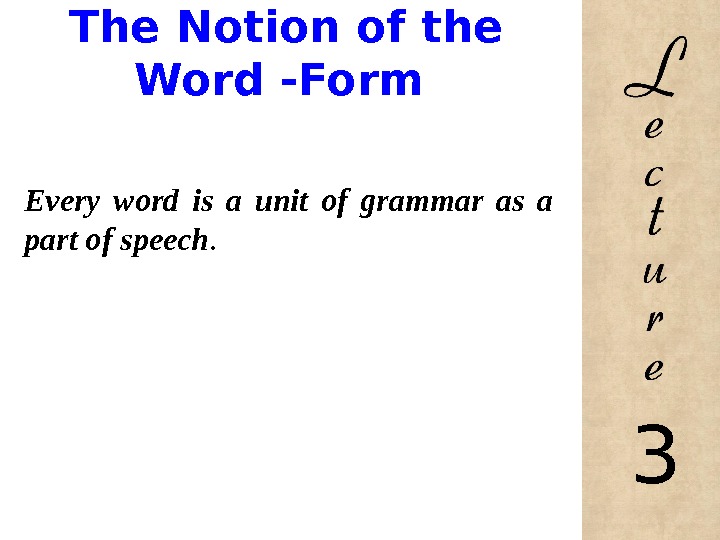
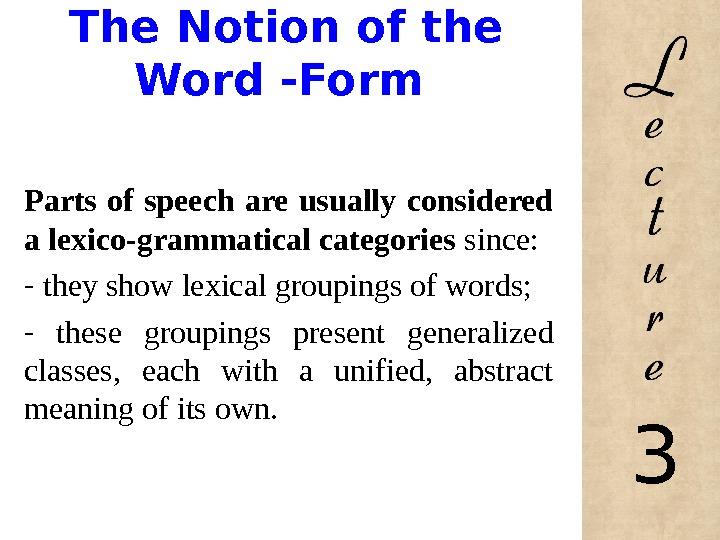
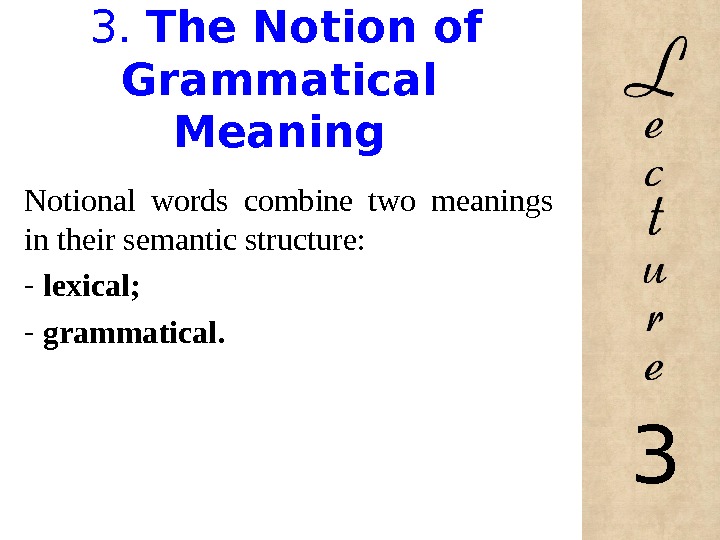

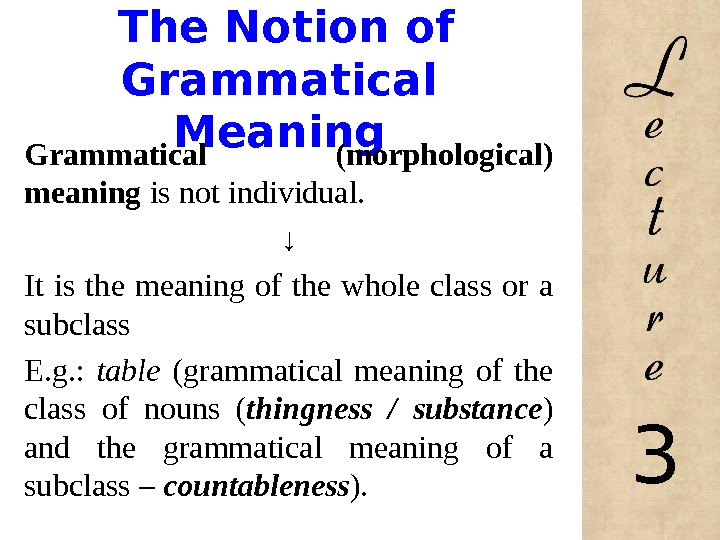
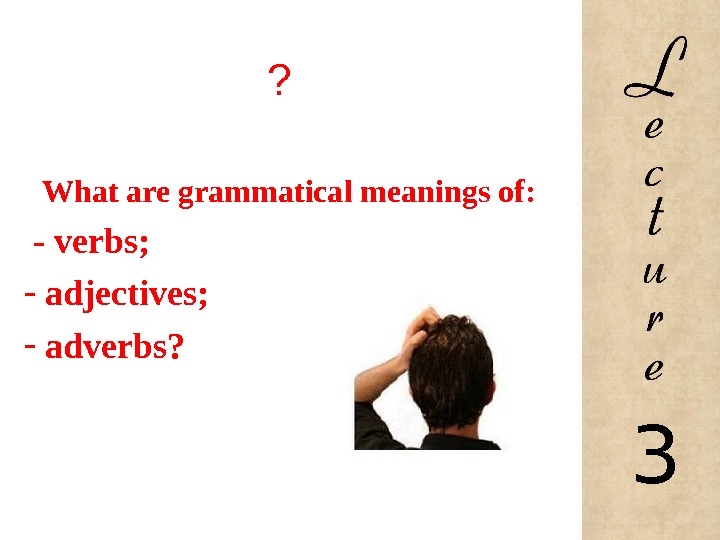
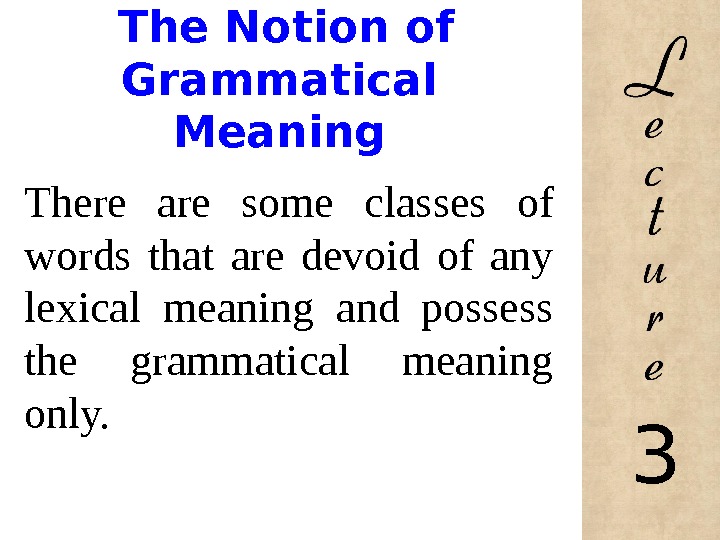
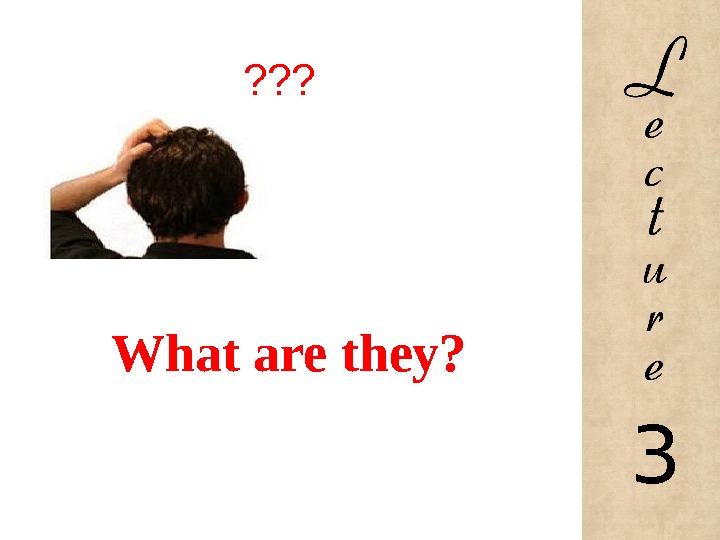
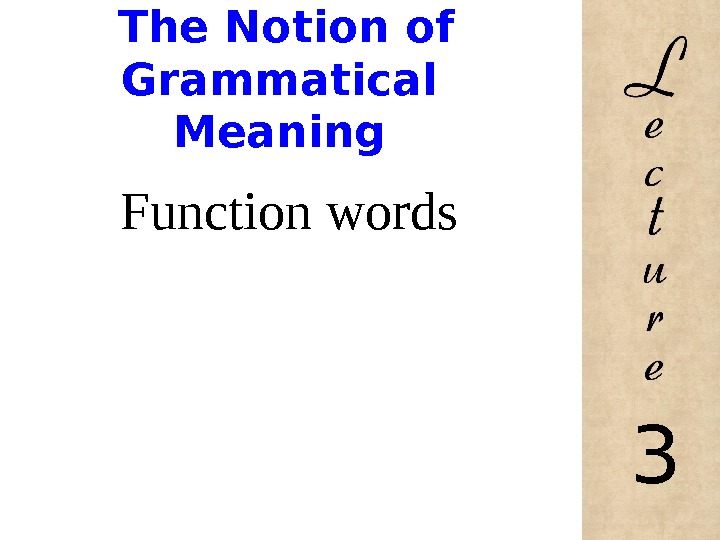

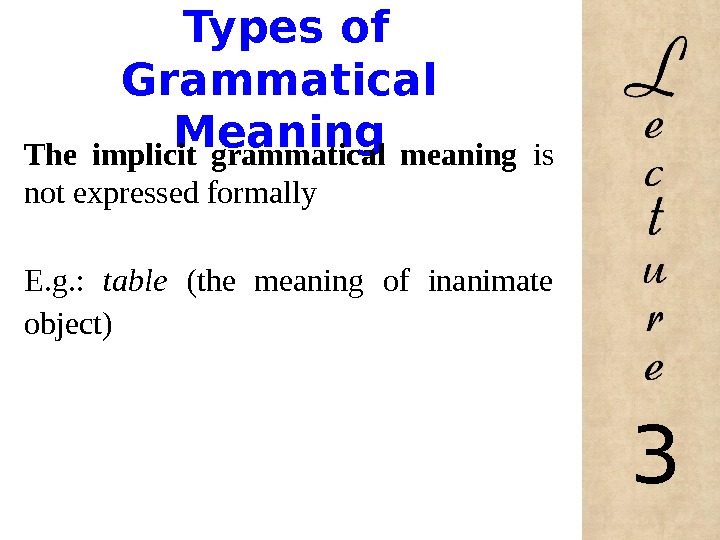
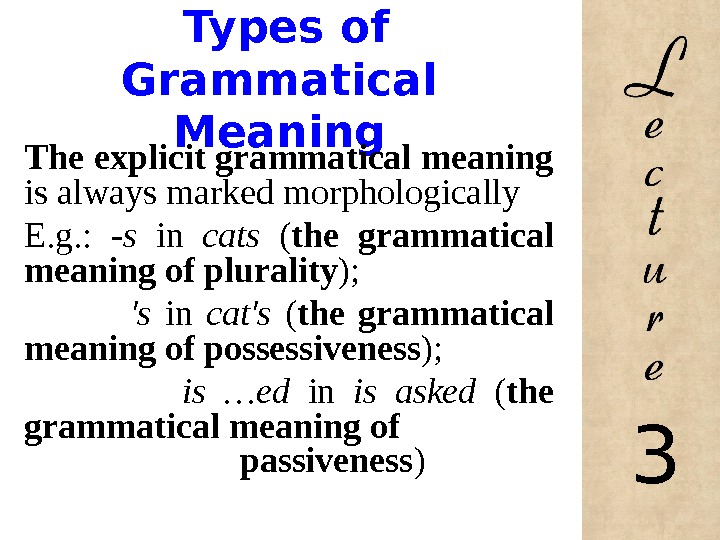

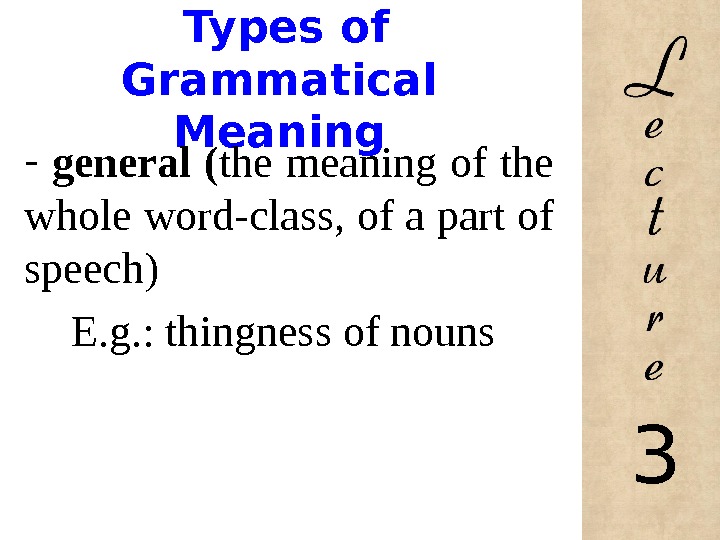
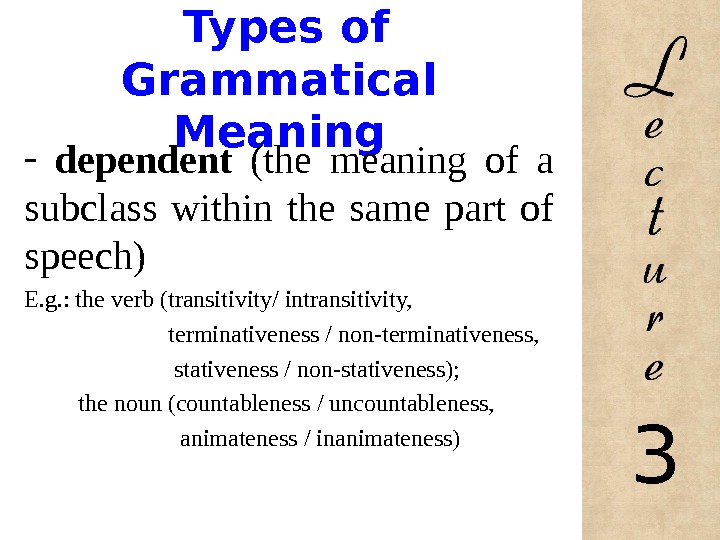
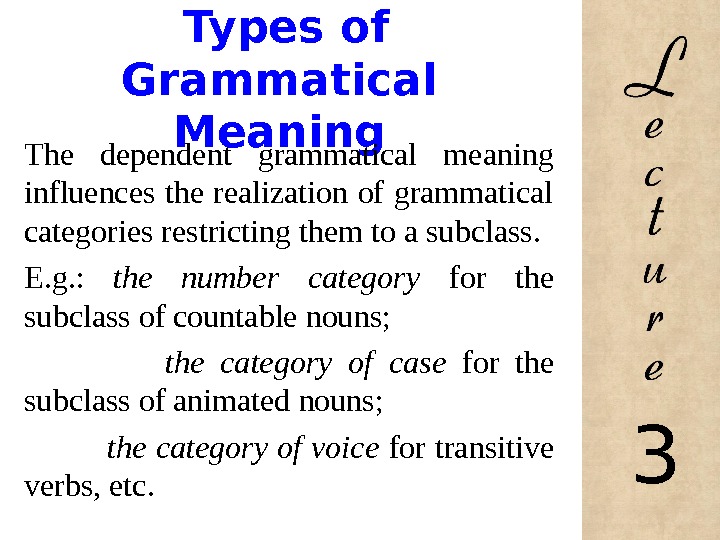

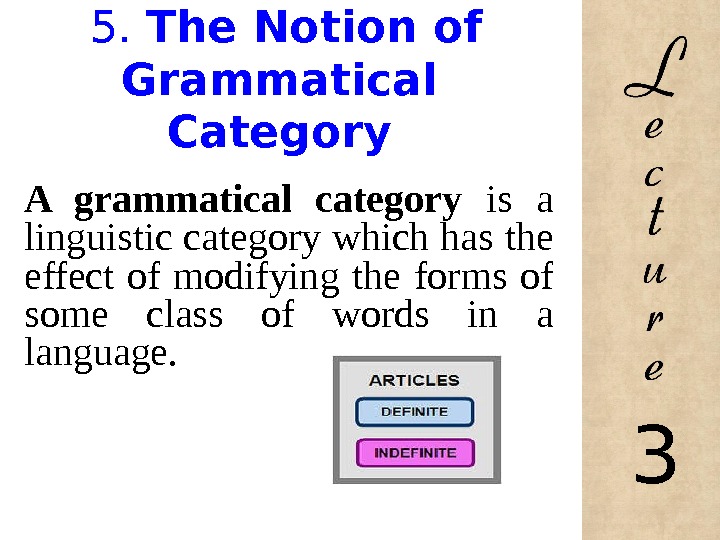


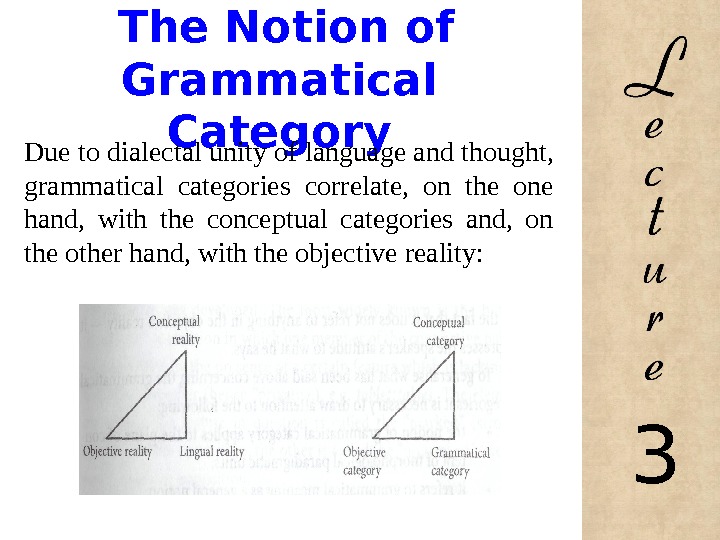
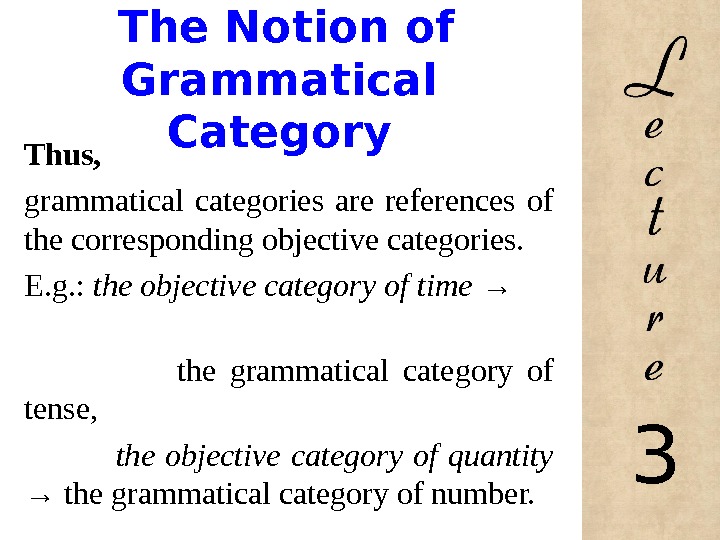
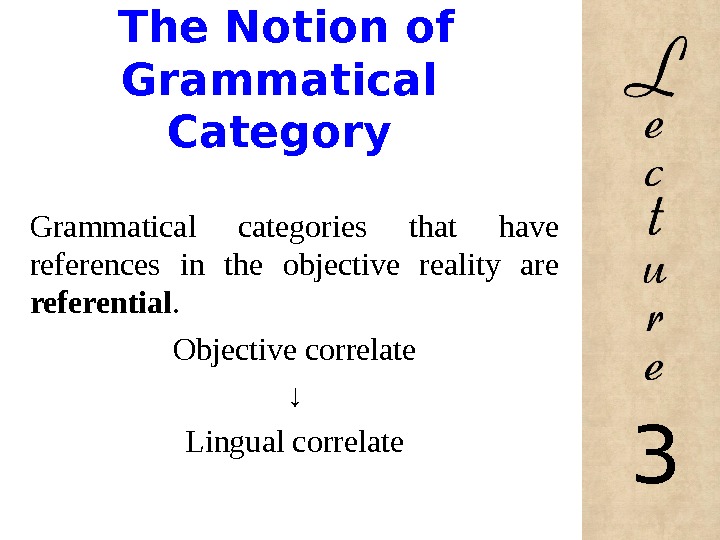

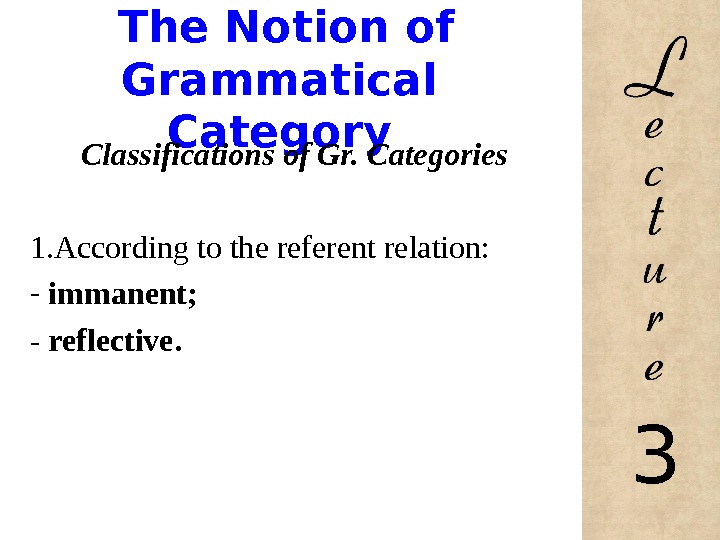
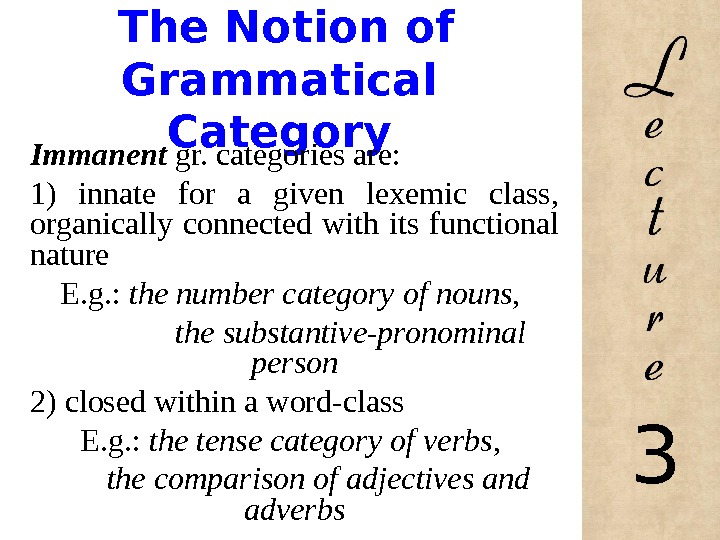
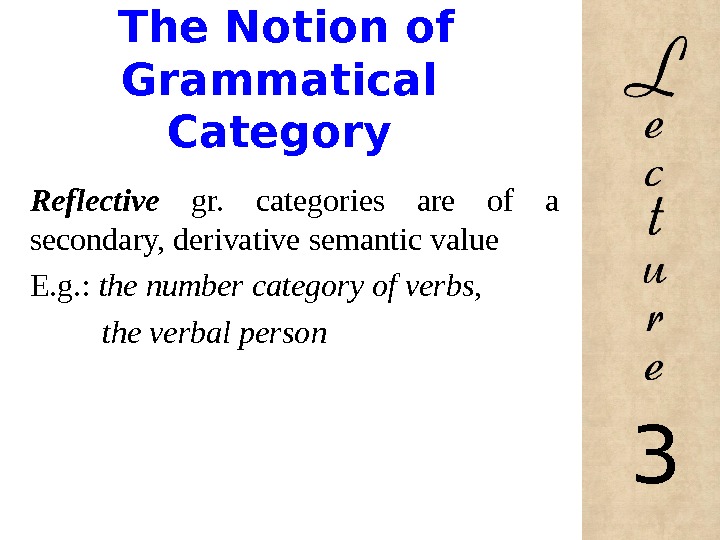

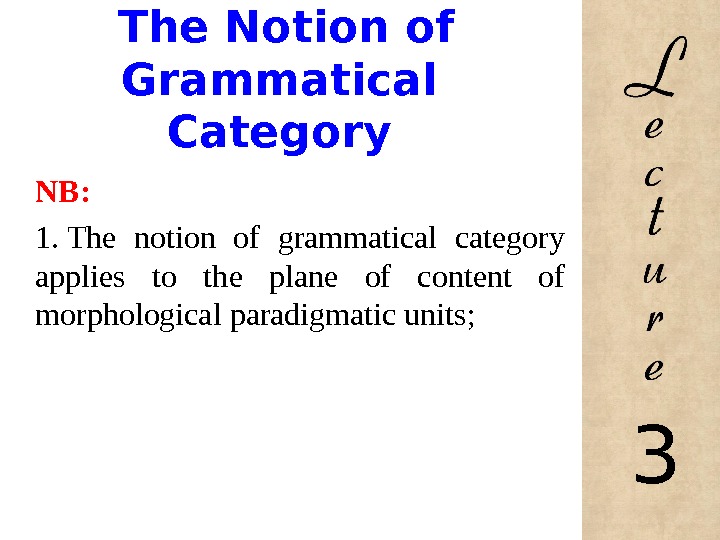
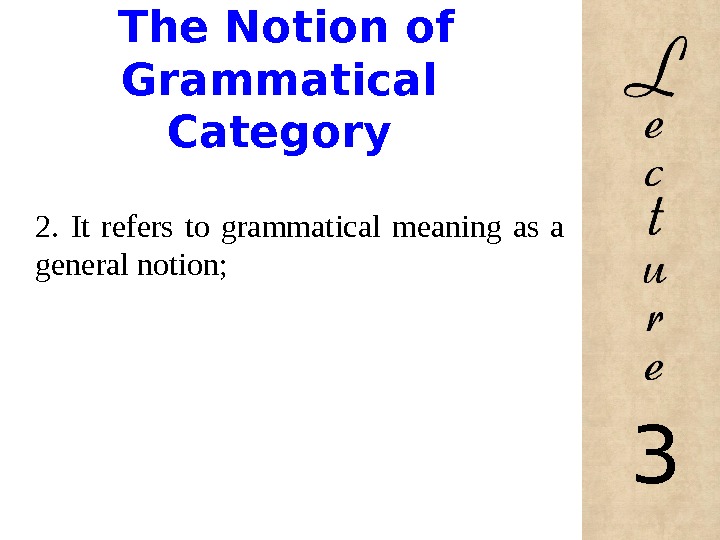

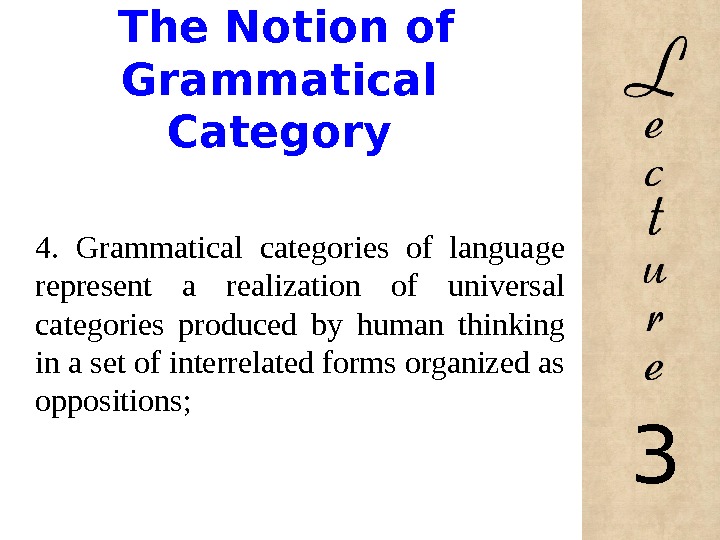

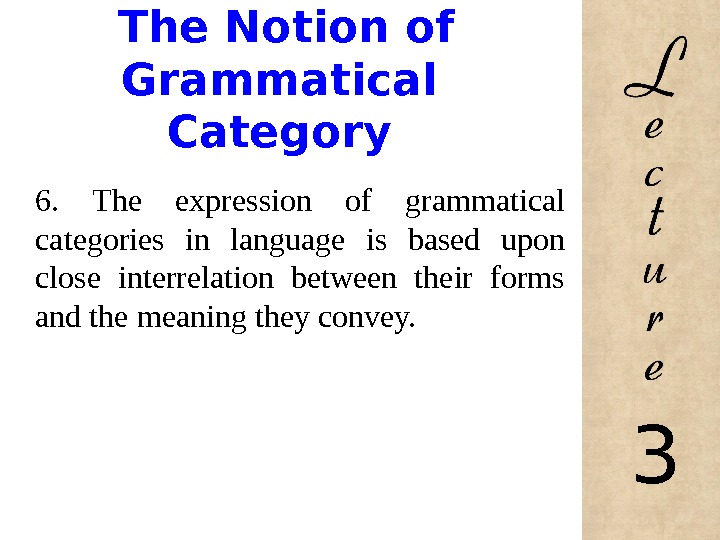
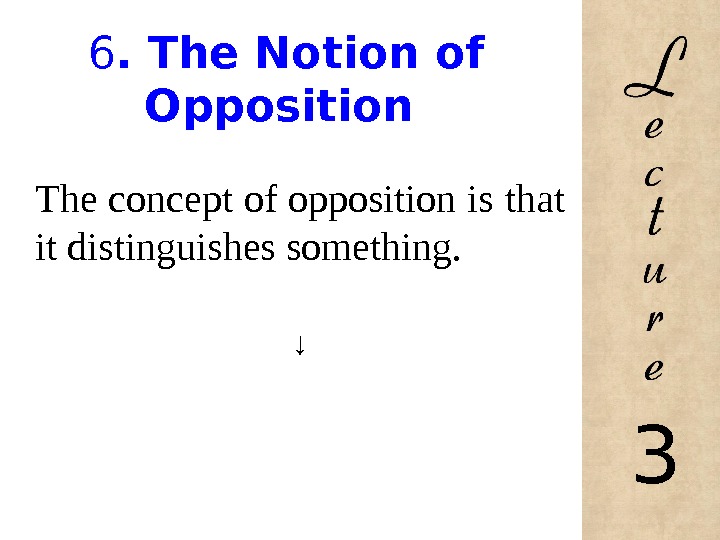
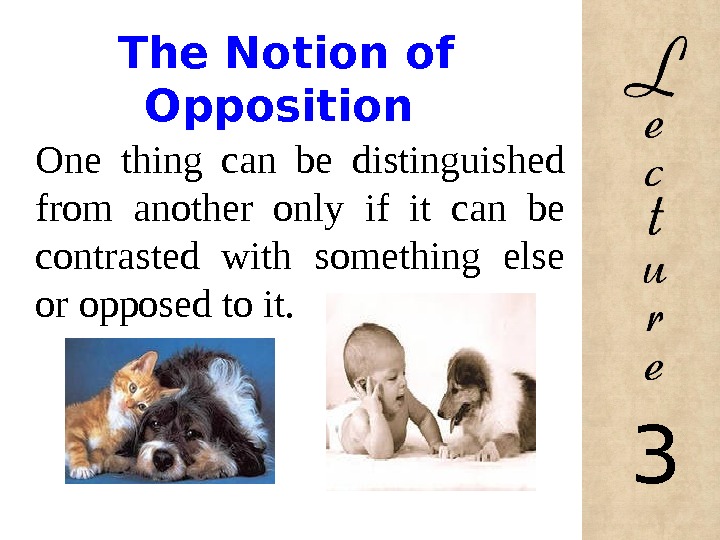
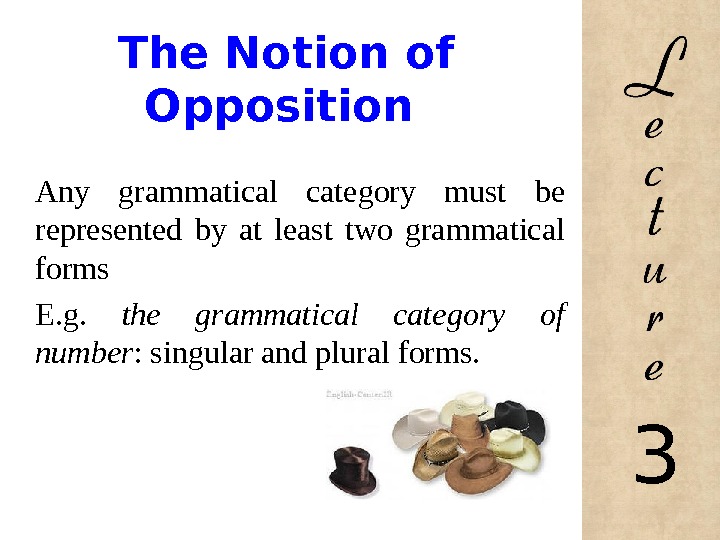
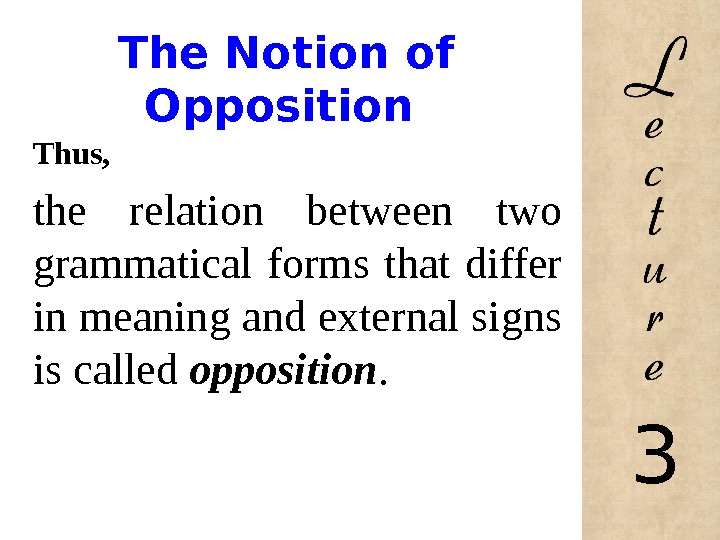

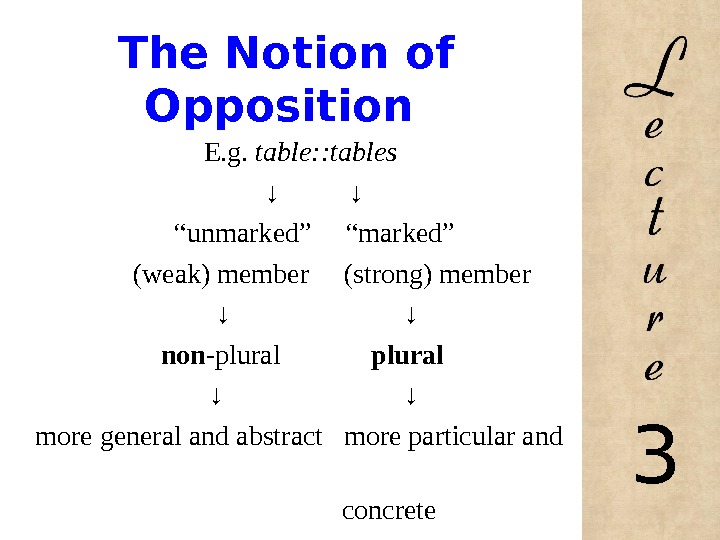
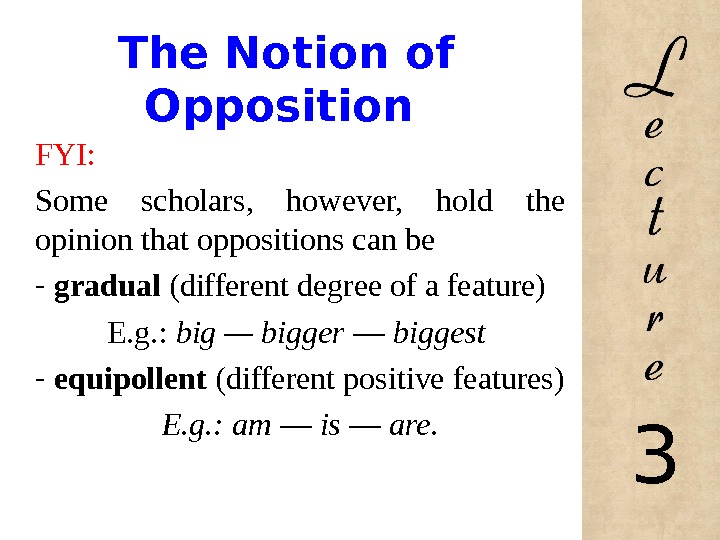
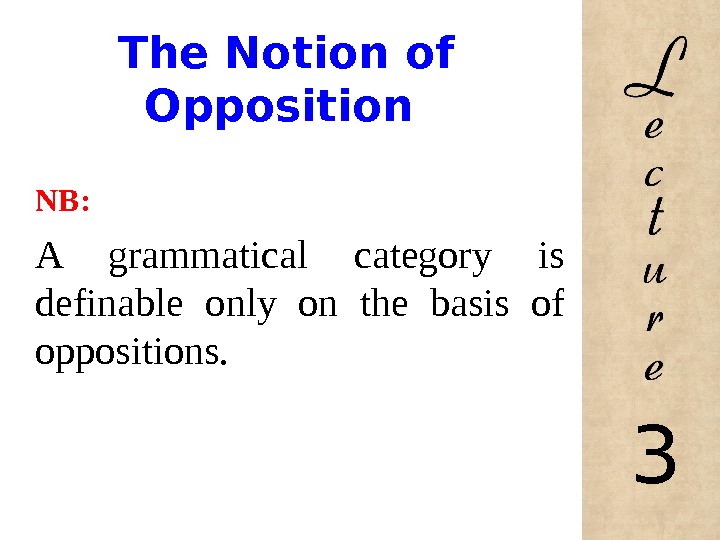
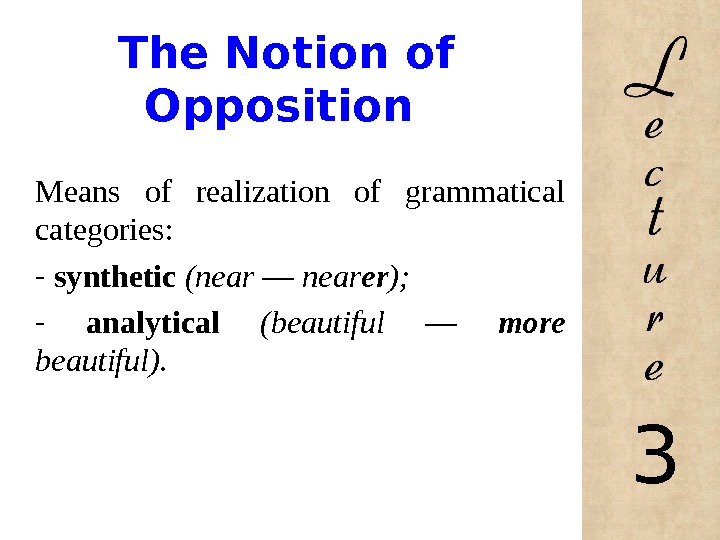
Скачать материал

Скачать материал




- Сейчас обучается 396 человек из 63 регионов


- Сейчас обучается 268 человек из 64 регионов


Описание презентации по отдельным слайдам:
-
1 слайд
GRAMMATICAL MEANING
OF THE WORD -
2 слайд
1. The problem of word definition.
2. The notion of the word-form.
3. The notion of «grammatical meaning».
4. Types of grammatical meaning.
5. The notion of «grammatical category».
6. The notion of «opposition».3
-
3 слайд
1.The Problem of Word Definition
The word is considered to be the central (though not the only) linguistic unit of language.
3 -
4 слайд
The Problem of Word Definition
In the written language words are clearly identified by spaces between them.
3
-
5 слайд
The Problem of Word Definition
In the spoken language the problem cannot be solved this way.
↓
If we listen to an unfamiliar language, we find it difficult to divide up the speech into single words.3
-
6 слайд
The Problem of Word Definition
Approaches
to the problem of word definition:
the word is a semantic unit, a unit of meaning;
the word is a marked phonological unit;
the word is an indivisible unit.3
-
7 слайд
The Problem of Word Definition
Semantic definition of the word:
“…a unit of a particular meaning with a particular complex of sounds capable of a particular grammatical employment».
↓
The word is a linguistic unit that has a single meaning.3
-
8 слайд
The Problem of Word Definition
BUT:
heavy smoker ≠ heavy and
smoker
criminal lawyer;
the King of England’s hat.3
-
9 слайд
The Problem of Word Definition
The problem:
the word is not always a single unit.
3
-
10 слайд
The Problem of Word Definition
A phonological criterion
that stuff that’s tough
a nice cakean ice cake
grey day Grade A
↓3
-
11 слайд
The Problem of Word Definition
It is hard to distinguish the real meaning without a proper context.
3 -
12 слайд
The Problem of Word Definition
The word as an indivisible unit
“The word is a minimum free form“
(L. Bloomfield)
↓
The word is the smallest unit of speech that can occur in isolation.3
-
13 слайд
The Problem of Word Definition
BUT:
a or the3
-
14 слайд
The Problem of Word Definition
Thus,
the word is a linguistic unit larger than a morpheme but smaller than a phrase.3
-
15 слайд
The Problem of Word Definition
In this case the word can be defined as:
• An orthographic word (something written with white spaces at both ends but no white space in the middle).
3
-
16 слайд
The Problem of Word Definition
• A phonological word (something pronounced as a single unit).
3
-
17 слайд
The Problem of Word Definition
• A lexical item, or lexeme, (a dictionary word).
3
-
18 слайд
The Problem of Word Definition
• A grammatical word-form (GWF) (or morphosyntactic word) (any one of the several forms which a lexical item may assume for grammatical purposes).
3
-
19 слайд
The Problem of Word Definition
The item ice cream is:
two orthographic words,
but
— a single phonological word (it is pronounced as a unit),
— a single lexical item (it has its own entry in a dictionary),
— a single GWF (indeed, it hardly has another form unless you think the plural ice cream is good English).3
-
20 слайд
The Problem of Word Definition
The singular dog and the plural dogs:
— a single orthographic word,
— a single phonological word,
a single GWF,
but they both
— represent the same lexical item (only one entry in the dictionary).3
-
21 слайд
The Problem of Word Definition
???
take, takes, took, taken, is taking:3
-
22 слайд
The Problem of Word Definition
take, takes, took, taken and is taking:
— five orthographic words,
— five phonological words,
five GWFs (at least),
but only
— one lexical item.3
-
23 слайд
The Problem of Word Definition
???
the contraction hasn’t3
-
24 слайд
The Problem of Word Definition
The contraction hasn’t is:
— a single orthographic word,
a single phonological word,
— two lexical items (have and not),
— two GWFs (has and not).3
-
25 слайд
The Problem of Word Definition
???
The phrasal verb make up (as in She made up her face)3
-
26 слайд
The Problem of Word Definition
The phrasal verb make up (as in She made up her face):
— two orthographic words,
— two phonological words,
— one lexical item (because of its unpredictable meaning, it must be entered separately in the dictionary).
— has several GWFs (make up, makes up, made up, making up).3
-
27 слайд
The Problem of Word Definition
???
make up
(She made up a story)3
-
28 слайд
The Problem of Word Definition
make up (She made up a story):
— a different lexical item from the preceding one (a separate dictionary entry is required),
but
— this lexical item exhibits the same orthographic, phonological and grammatical forms as the first.3
-
29 слайд
The Problem of Word Definition
So,
the word is not a clearly definable linguistic unit.3
-
30 слайд
The Problem of Word Definition
For the sake of linguistic description, we will proceed from the following statements:
— the word is a meaningful unit differentiating word-groups at the upper level and integrating morphemes at the lower level;3
-
31 слайд
The Problem of Word Definition
— the word is the main expressive unit of human language, which ensures the thought-forming function of language;
3
-
32 слайд
The Problem of Word Definition
the word It is also the basic nominative unit of language with the help of which the naming function of language is realized;
3
-
33 слайд
The Problem of Word Definition
in the structure of language the word belongs to the upper stage of the morphological level;
3
-
34 слайд
The Problem of Word Definition
the word is a unit of the sphere of «language» and it exists only through its speech actualization;
3
-
35 слайд
The Problem of Word Definition
one of the most characteristic features of the word is its indivisibility.
3
-
36 слайд
The Problem of Word Definition
the word is a bilateral entity
concept
WORD = ———————
sound image3
-
37 слайд
2. The Notion of the Word -Form
The term «word-form“ shows that the word is a carrier of grammatical information.
E.g.: speaks — the present tense third
person singular
speak, spoke, is speaking
↓
Here the relational property of grammatical meaning is revealed.3
-
38 слайд
The Notion of the Word -Form
Grammatical meanings of a word-form are very abstract and general.
They are peculiar of a whole class of words, unite it so that each word of the class expresses the corresponding grammatical meaning together with its individual, concrete semantics.3
-
39 слайд
The Notion of the Word -Form
E.g.:
the meaning of the plural is rendered by the regular plural suffix –(e)s, phonemic interchange and a few lexeme-bound suffixes.3
-
40 слайд
The Notion of the Word -Form
Due to the generalized character of the plural, we say that different groups of nouns «take» this form with strictly defined variations in the mode of expression.
The variations can be of more systemic (phonological conditioning) and less systemic (etymological conditioning) nature.3
-
41 слайд
The Notion of the Word -Form
Cf.: faces, branches, matches, judges;
books, rockets, boats, chiefs, proofs;
dogs, beads, films, stones, hens;
lives, wives, thieves, leaves;
oxen, children, brethren;
swine, sheep, deer;
men, women, feet, teeth, geese, mice, lice;
formulae, antennae;
data, errata, strata, addenda, memoranda;
radii, genii, nuclei;
crises, bases, analyses, axes;
phenomena, criteria.3
-
42 слайд
The Notion of the Word -Form
The lexical meaning of the word is irrelevant for the detection of the type of the word-form.
3
-
43 слайд
The Notion of the Word -Form
A word-form may be analytical by structure. In this case it is equivalent to one word as it expresses one unified content of a word, both from the point of view of grammatical and lexical meaning.
E.g.: has spoken3
-
44 слайд
The Notion of the Word -Form
Words (as well as morphemes) are directly observable units by nature as they are characterized by a definite material structure of their own.
They can be registered and enumerated in any language.
3
-
45 слайд
The Notion of the Word -Form
The system of morphological units is a closed system. It means that all its items are on the surface and can be embraced in an inventory of forms.
3
-
46 слайд
The Notion of the Word -Form
Every word is a unit of grammar as a part of speech.
3
-
47 слайд
The Notion of the Word -Form
Parts of speech are usually considered a lexico-grammatical categories since:
they show lexical groupings of words;
these groupings present generalized classes, each with a unified, abstract meaning of its own.3
-
48 слайд
3. The Notion of Grammatical Meaning
Notional words combine two meanings in their semantic structure:
lexical;
grammatical.3
-
49 слайд
The Notion of Grammatical Meaning
Lexical meaning is the individual meaning of the word
E.g.: table — a definite piece of furniture with a flat top supported by one or more upright legs,
speak – to express thoughts aloud, using the voice.3
-
50 слайд
The Notion of Grammatical Meaning
Grammatical (morphological) meaning is not individual.
↓
It is the meaning of the whole class or a subclass
E.g.: table (grammatical meaning of the class of nouns (thingness / substance) and the grammatical meaning of a subclass – countableness).3
-
51 слайд
?
What are grammatical meanings of:
— verbs;
adjectives;
adverbs?3
-
52 слайд
The Notion of Grammatical Meaning
There are some classes of words that are devoid of any lexical meaning and possess the grammatical meaning only.
3
-
-
54 слайд
The Notion of Grammatical Meaning
Function words
3
-
55 слайд
4.Types of Grammatical Meaning
The grammatical meaning may be:
explicit;
implicit.
3 -
56 слайд
Types of Grammatical Meaning
The implicit grammatical meaning is not expressed formallyE.g.: table (the meaning of inanimate object)
3
-
57 слайд
Types of Grammatical Meaning
The explicit grammatical meaning is always marked morphologically
E.g.: -s in cats (the grammatical meaning of plurality);
‘s in cat’s (the grammatical meaning of possessiveness);
is …ed in is asked (the grammatical meaning of passiveness)3
-
58 слайд
Types of Grammatical Meaning
Types of the implicit grammatical meaning:
general
dependent3
-
59 слайд
Types of Grammatical Meaning
general (the meaning of the whole word-class, of a part of speech)
E.g.: thingness of nouns3
-
60 слайд
Types of Grammatical Meaning
dependent (the meaning of a subclass within the same part of speech)
E.g.: the verb (transitivity/ intransitivity,
terminativeness / non-terminativeness,
stativeness / non-stativeness);
the noun (countableness / uncountableness,
animateness / inanimateness)3
-
61 слайд
Types of Grammatical Meaning
The dependent grammatical meaning influences the realization of grammatical categories restricting them to a subclass.
E.g.: the number category for the subclass of countable nouns;
the category of case for the subclass of animated nouns;
the category of voice for transitive verbs, etc.3
-
62 слайд
Types of Grammatical Meaning
3
-
63 слайд
5. The Notion of Grammatical Category
A grammatical category is a linguistic category which has the effect of modifying the forms of some class of words in a language.
3
-
64 слайд
The Notion of Grammatical Category
Its structure displays two or more forms applied to a definite class of words and used in somewhat different grammatical circumstances.
↓↓3
-
65 слайд
The Notion of Grammatical Category
Grammatical categories are made up by the unity of identical grammatical meanings that have the same form and meaning
E.g. singular : plural3
-
66 слайд
The Notion of Grammatical Category
Due to dialectal unity of language and thought, grammatical categories correlate, on the one hand, with the conceptual categories and, on the other hand, with the objective reality:3
-
67 слайд
The Notion of Grammatical Category
Thus,
grammatical categories are references of the corresponding objective categories.
E.g.: the objective category of time →
the grammatical category of tense,
the objective category of quantity → the grammatical category of number.3
-
68 слайд
The Notion of Grammatical Category
Grammatical categories that have references in the objective reality are referential.
Objective correlate
↓
Lingual correlate3
-
69 слайд
The Notion of Grammatical Category
Grammatical categories that do not correspond to anything in the objective reality and correlate only with conceptual matters are significational. They are few (e.g. the categories of mood and degree).
Conceptual correlate
↓
Lingual correlate3
-
70 слайд
The Notion of Grammatical Category
Classifications of Gr. CategoriesAccording to the referent relation:
immanent;
— reflective.
3 -
71 слайд
The Notion of Grammatical Category
Immanent gr. categories are:
1) innate for a given lexemic class, organically connected with its functional nature
E.g.: the number category of nouns,
the substantive-pronominal person
2) closed within a word-class
E.g.: the tense category of verbs,
the comparison of adjectives and adverbs3
-
72 слайд
The Notion of Grammatical Category
Reflective gr. categories are of a secondary, derivative semantic value
E.g.: the number category of verbs,
the verbal person3
-
73 слайд
The Notion of Grammatical Category
2. According to the changeability of the exposed feature
— unchangeable / derivational (constant feature categories)
E.g.: the gender category of nouns represented by the system of the 3rd person pronouns
— changeable / demutative (variable feature categories)
E.g.: the number category of nouns,
the degrees of comparison3
-
74 слайд
The Notion of Grammatical Category
NB:
1. The notion of grammatical category applies to the plane of content of morphological paradigmatic units;3
-
75 слайд
The Notion of Grammatical Category
2. It refers to grammatical meaning as a general notion;
3
-
76 слайд
The Notion of Grammatical Category
3. It does not nominate things but expresses relations, that is why it has to be studied in terms of oppositions;
3
-
77 слайд
The Notion of Grammatical Category
4. Grammatical categories of language represent a realization of universal categories produced by human thinking in a set of interrelated forms organized as oppositions;
3
-
78 слайд
The Notion of Grammatical Category
5. Grammatical categories are not uniform, they vary in accordance with the part of speech they belong to and the meaning they express;
3
-
79 слайд
The Notion of Grammatical Category
6. The expression of grammatical categories in language is based upon close interrelation between their forms and the meaning they convey.
3
-
80 слайд
6. The Notion of Opposition
The concept of opposition is that it distinguishes something.
↓
3 -
81 слайд
The Notion of Opposition
One thing can be distinguished from another only if it can be contrasted with something else or opposed to it.3
-
82 слайд
The Notion of Opposition
Any grammatical category must be represented by at least two grammatical forms
E.g. the grammatical category of number: singular and plural forms.3
-
83 слайд
The Notion of Opposition
Thus,
the relation between two grammatical forms that differ in meaning and external signs is called opposition.3
-
84 слайд
The Notion of Opposition
The most widely known opposition is the binary «privative» opposition.In it one member of the contrastive pair is characterized by the presence of a certain feature which the other member lacks
3
-
85 слайд
The Notion of Opposition
E.g. table::tables
↓ ↓
“unmarked” “marked”
(weak) member (strong) member
↓ ↓
non-plural plural
↓ ↓
more general and abstract more particular and
concrete
(used in a wider range of contexts)3
-
86 слайд
The Notion of Opposition
FYI:
Some scholars, however, hold the opinion that oppositions can be
gradual (different degree of a feature)
E.g.: big — bigger — biggest
equipollent (different positive features)
E.g.: am — is — are.3
-
87 слайд
The Notion of Opposition
NB:
A grammatical category is definable only on the basis of oppositions.3
-
88 слайд
The Notion of Opposition
Means of realization of grammatical categories:
synthetic (near — nearer);
analytical (beautiful — more beautiful).3
-
Найдите материал к любому уроку, указав свой предмет (категорию), класс, учебник и тему:
6 210 049 материалов в базе
- Выберите категорию:
- Выберите учебник и тему
- Выберите класс:
-
Тип материала:
-
Все материалы
-
Статьи
-
Научные работы
-
Видеоуроки
-
Презентации
-
Конспекты
-
Тесты
-
Рабочие программы
-
Другие методич. материалы
-
Найти материалы
Другие материалы
- 27.12.2020
- 4749
- 2
- 27.12.2020
- 4947
- 11
- 27.12.2020
- 5785
- 13
- 27.12.2020
- 5022
- 9
- 27.12.2020
- 4057
- 1
- 27.12.2020
- 3882
- 0
- 27.12.2020
- 3905
- 1
- 27.12.2020
- 3300
- 4
Вам будут интересны эти курсы:
-
Курс повышения квалификации «Основы местного самоуправления и муниципальной службы»
-
Курс профессиональной переподготовки «Организация и предоставление туристских услуг»
-
Курс профессиональной переподготовки «Клиническая психология: организация реабилитационной работы в социальной сфере»
-
Курс повышения квалификации «Организация практики студентов в соответствии с требованиями ФГОС педагогических направлений подготовки»
-
Курс повышения квалификации «Этика делового общения»
-
Курс повышения квалификации «Маркетинг в организации как средство привлечения новых клиентов»
-
Курс повышения квалификации «Правовое регулирование рекламной и PR-деятельности»
-
Курс повышения квалификации «Финансы предприятия: актуальные аспекты в оценке стоимости бизнеса»
-
Курс профессиональной переподготовки «Управление ресурсами информационных технологий»
-
Курс профессиональной переподготовки «Организация деятельности помощника-референта руководителя со знанием иностранных языков»
-
Курс профессиональной переподготовки «Организация деятельности секретаря руководителя со знанием английского языка»
-
Курс профессиональной переподготовки «Управление сервисами информационных технологий»
-
Курс профессиональной переподготовки «Эксплуатация и обслуживание общего имущества многоквартирного дома»
-
Курс профессиональной переподготовки «Техническая диагностика и контроль технического состояния автотранспортных средств»
-
Курс профессиональной переподготовки «Организация маркетинговой деятельности»

























































































